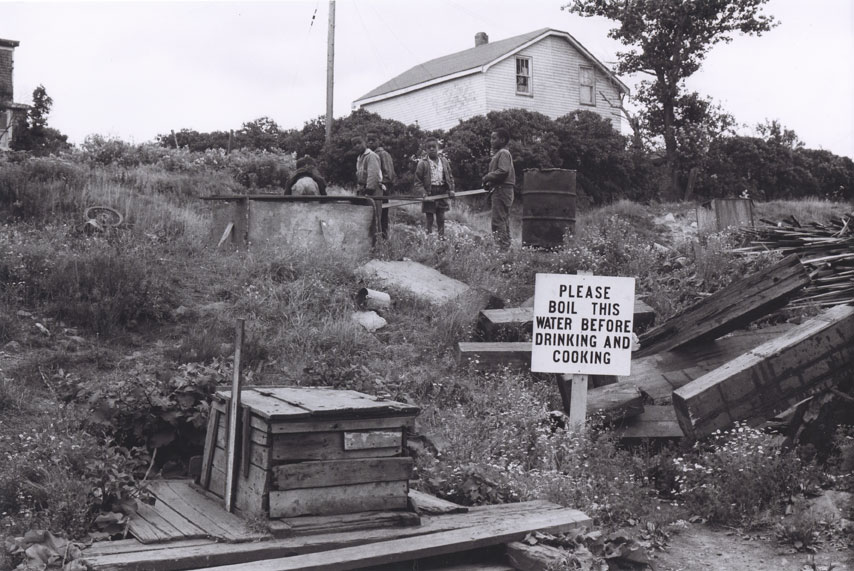A United Nations working group is calling out Canada for its history of racist policies — specifically highlighting its history of slavery and the “deplorable” destruction of Africville, a black community in Nova Scotia.The report released Monday recommends that Canada apologize for slavery, consider paying reparations, build monuments to African Canadians, and create a national department of African Canadian affairs, among other things.One former resident of Africville, a black community that Halifax demolished in the 1960s to make way for a bridge, and where people trace their family roots back to slaves brought across the Atlantic in the 1700s, commended the move.“I’m very pleased that the U.N. has included Africville as an example because indeed it is, not only of blatant racism but of environmental racism,” said Irvine Carvery, president of the Africville Genealogy Society.“All of those factors played into the destruction of the community of Africville,” Carvery told VICE News on Monday, calling on the prime minister to implement the U.N. working group’s recommendations.After visiting several cities in Canada last fall, the U.N. Working Group of Experts on People of African Descent highlighted Canada’s history of slavery, environmental racism, overrepresentation of African-Canadians in jails, and racial bias the justice system. The report focuses on Nova Scotia, where English and French settlers brought the first Black slaves as part of efforts to colonize the area.Slavery in Canada enjoys little attention compared to south of the border, but it existed in what is today known as Canada until it was abolished in most British colonies 1834. The legacy of slavery continues in Canadian Black communities today.VICE News reached out to several government departments that met with the UN working group when it visited Ottawa in October 2016, including Global Affairs, Statistics Canada, Canadian Heritage, Immigration, Refugees and Citizenship, Justice and Corrections Canada, but did not immediately hear back.For 150 years, Africville perched on the edge of Halifax. It was often said that where the pavement ended, Africville began. While it existed, some Africville residents were landowners who paid taxes but lacked basic services like running water or sewer pipes. Instead the city located industrial hazards in and around the community, including a slaughterhouse, an open dump and an infectious disease hospital.
The report focuses on Nova Scotia, where English and French settlers brought the first Black slaves as part of efforts to colonize the area.Slavery in Canada enjoys little attention compared to south of the border, but it existed in what is today known as Canada until it was abolished in most British colonies 1834. The legacy of slavery continues in Canadian Black communities today.VICE News reached out to several government departments that met with the UN working group when it visited Ottawa in October 2016, including Global Affairs, Statistics Canada, Canadian Heritage, Immigration, Refugees and Citizenship, Justice and Corrections Canada, but did not immediately hear back.For 150 years, Africville perched on the edge of Halifax. It was often said that where the pavement ended, Africville began. While it existed, some Africville residents were landowners who paid taxes but lacked basic services like running water or sewer pipes. Instead the city located industrial hazards in and around the community, including a slaughterhouse, an open dump and an infectious disease hospital.
Advertisement
The report, presented to the U.N. Human Rights Council in Geneva on Monday, also criticised police “carding” and police killings of black men including Andrew Loku and Abdirahman Abdi, higher rates of poverty for Black Canadians than the white population, gaps in education and other issues.“Despite Canada’s reputation for promoting multiculturalism and diversity and the positive measures taken to address racial discrimination, the Working Group is deeply concerned about the human rights situation of African Canadians,” the report states.The legacy of slavery continues in Canadian Black communities today.
Advertisement

HISTORY OF EXCLUSION
In the 1960s, the city forcibly evicted Africville residents, demolished their houses and church, and relocated them to a housing project north end Halifax. Few residents saw any compensation for the loss of their homes and livelihoods, according to former residents and descendents who are bringing forward a lawsuit seeking compensation. It is still awaiting certification.The UN working group’s report calls this a “dark period” of Nova Scotia’s historyIn 2010, Halifax’s mayor apologized for the destruction of the community and contributed $3 million toward a museum and church on the former Africville site. Many former residents and their descendants are still asking for further compensation.Today, research has shown that dumps and industrial sites in Nova Scotia are still disproportionately located near African-Nova Scotian and First Nations communities.The UN working group’s report calls this a “dark period” of Nova Scotia’s history